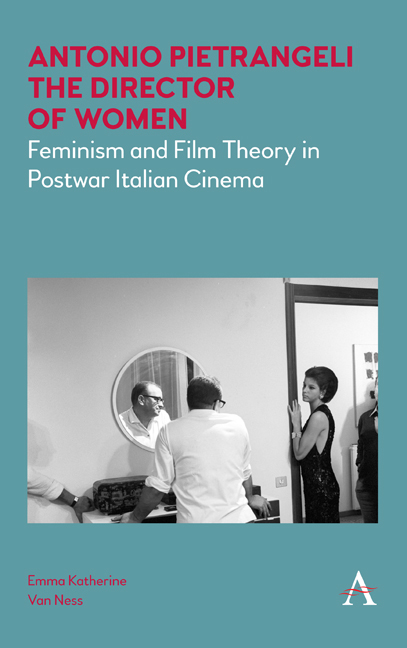Book contents
- Frontmatter
- Dedication
- Contents
- List of Illustrations
- Acknowledgments
- Vita
- Introduction: Antonio Pietrangeli, A Brief History
- Chapter 1 Pietrangelian Film Theory: From Neorealism to Feminism
- Chapter 2 Maid from the Margins: Il sole negli occhi
- Chapter 3 The Coming of Age of a Teenage Bride: Nata di marzo
- Chapter 4 Legally Bound: Political Realism and Prostitution in Adua e le compagne
- Chapter 5 Fantasmi a Roma: Sur-Realism and the Time-Image
- Chapter 6 The Dora Problem: La parmigiana, Piatti, Pietrangeli and Freud
- Chapter 7 Too Much Woman: Marriage, Power, and Excess in La visita
- Chapter 8 Breaking Faith: Il magnifico cornuto, Envy and the Crisis of Vision
- Chapter 9 Io la conoscevo bene … Or did I? Antonio Pietrangeli, the Author and the Actress
- Conclusion: Antonio Pietrangeli, Feminism and Film Theory
- Bibliography
- Index
Conclusion: Antonio Pietrangeli, Feminism and Film Theory
Published online by Cambridge University Press: 06 May 2020
- Frontmatter
- Dedication
- Contents
- List of Illustrations
- Acknowledgments
- Vita
- Introduction: Antonio Pietrangeli, A Brief History
- Chapter 1 Pietrangelian Film Theory: From Neorealism to Feminism
- Chapter 2 Maid from the Margins: Il sole negli occhi
- Chapter 3 The Coming of Age of a Teenage Bride: Nata di marzo
- Chapter 4 Legally Bound: Political Realism and Prostitution in Adua e le compagne
- Chapter 5 Fantasmi a Roma: Sur-Realism and the Time-Image
- Chapter 6 The Dora Problem: La parmigiana, Piatti, Pietrangeli and Freud
- Chapter 7 Too Much Woman: Marriage, Power, and Excess in La visita
- Chapter 8 Breaking Faith: Il magnifico cornuto, Envy and the Crisis of Vision
- Chapter 9 Io la conoscevo bene … Or did I? Antonio Pietrangeli, the Author and the Actress
- Conclusion: Antonio Pietrangeli, Feminism and Film Theory
- Bibliography
- Index
Summary
The Need for New Theories, New Fathers
This study of feminism, gender and film theory in Antonio Pietrangeli's films has intended to shed light on the importance of considering the director as a unique filmmaker whose woman-and couple-centric films have been misunderstood or marginalized because of their radical difference. While some readers may fault me at times for being overly theoretical, I have been consciously so, in the hopes that the drawing of numerous theoretical parallels between more current cultural and film criticism and Pietrangeli's films sparks dialogue and creates new ways of interpreting this director. He has, for a long time, deserved an autonomous study of his films in conjunction with developments in feminist and film theory; moreover, he deserves a serious study of his own film theory as well. Many feminists in Italian studies have called for this sort of theoretical methodology to treat a marginalized director and his works. Reflecting Pietrangeli's own theoretical and practical concern with the act of spectating, Jackie Stacey writes that “it is particularly important for feminists to challenge the absence of audiences from film studies, since it has reproduced an assumed passivity on the part of women in the cinema audience.” Pietrangeli was already thinking about the spectator in the postwar period as evidenced by his writings in Star magazine cited in this study's second chapter. While Catherine O’Rawe faults critics of Italian cinema for “the discipline's obsessive interest in neorealism and in auteur cinema,” in her article, “I padri e i maestri: Genre, Auteurs, and Absences in Italian Film Studies,” she calls for “a more sophisticated theoretical and historical approach to the study of both neorealism and popular cinema, in order to account for neglected films.” What is interesting about Pietrangeli is that whether or not one deems gender an important factor in his filmmaking, he both made important contributions in creating the atmosphere of neorealism and can be considered an auteur in his own right. Consequently, one feasible explanation, following the logic of O’Rawe's article, of why his films have not been examined in-depth by current Italian studies practitioners could be misunderstanding or misinterpretation of the gender element in his films, a well-documented hesitation to consider Pietrangeli a feminist.
- Type
- Chapter
- Information
- Antonio Pietrangeli, The Director of WomenFeminism and Film Theory in Postwar Italian Cinema, pp. 229 - 236Publisher: Anthem PressPrint publication year: 2020



